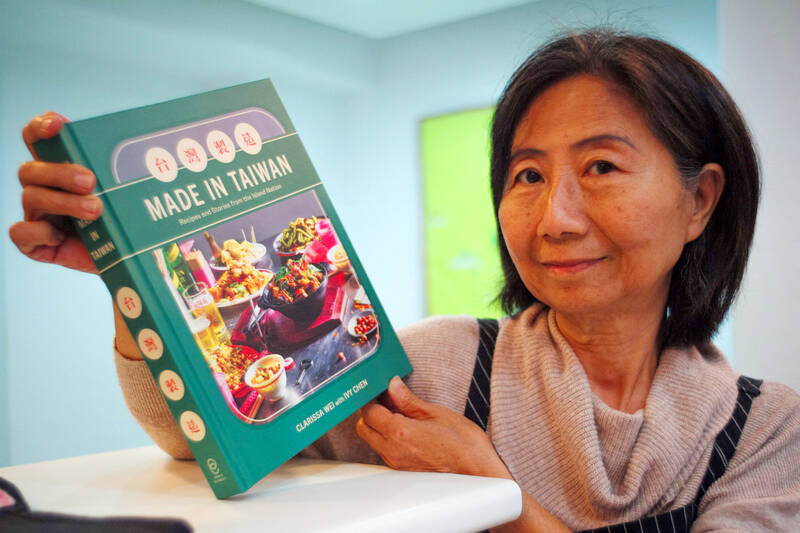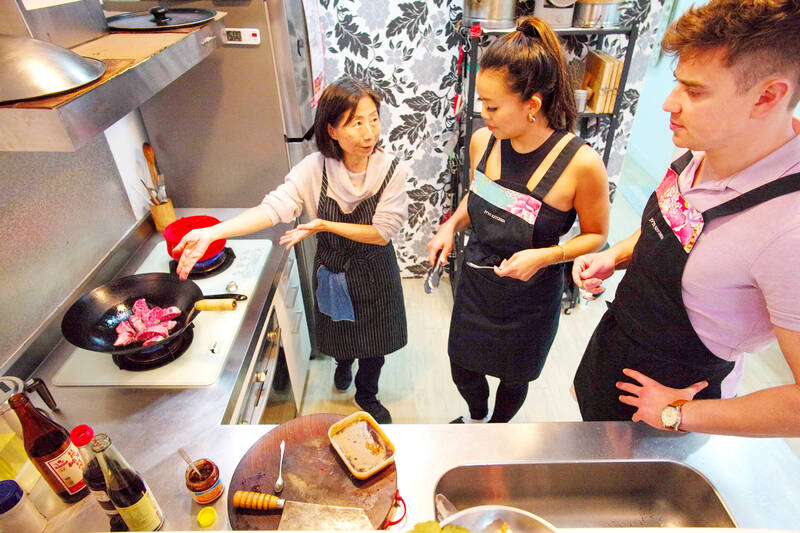Wrapping bamboo leaves around a nugget of sticky rice, cooking instructor Ivy Chen tries to replicate the recipe of a Taiwanese-style dumpling — a distinct cuisine integral to the democratic island’s identity.
She has spent nearly a quarter-century championing Taiwan’s cuisine and teaching recipes to tourists and sometimes locals, explaining how a dish that originated from across the strait in China has transformed into a Taiwanese staple.
The idea of a distinctly Taiwanese identity is looming large in the minds of some voters as the country prepares to go to the polls on Saturday to elect a new president and choose the path of relations with Beijing over the next four years.

Photo: AFP
“I am made in Taiwan — I was born here, I grew up here, I know all the authentic flavors, I know the traditions,” Chen, 66, said in her Taipei kitchen.
Her latest cookbook Made in Taiwan seeks to show that “Taiwanese cuisine stands on its own,” detailing recipes ubiquitous across the island such as the pork-belly buns and stinky tofu sold in Taipei’s night markets.
“(The) very act of being Taiwanese is a constant fight against unrelenting Chinese state attempts to obliterate our identity,” Chen’s co-author Clarissa Wei wrote in the book’s introduction.

Photo: AFP
“Our food isn’t a subset of Chinese food because Taiwan isn’t a part of China.”
Their staunch declaration of Taiwanese identity is in line with how the majority of the nation feels — a clear separation from China, even as it claims Taiwan as part of its territory.
After the Communist Party gained control in China in 1949, the nationalists fled to Taiwan, leading to a political standoff. But as it moved from autocracy to democracy by the 1990s, sentiments of the population — which had initially been educated under a Chinese-first curriculum — began shifting within a more Taiwan-centric environment.
Taiwan’s older generations see the “unification of China as inevitable,” said Liu Wen, an expert on history and ethnology at Academia Sinica.
“They respond to China’s encroachment and the military exercises in a passive way because they believe that eventually... Taiwan and China will be united.”
‘SECOND CLASS’ FOOD
This mindset is fading among younger generations.
In 1992, around a quarter of the population identified as Chinese. But less than three percent now feel that way, according to polling from National Chengchi University for the past three years.
Comedian Kylie Wang, who runs a popular news podcast, described herself as “without question” Taiwanese.
“I’m born here and I love my country so I’m Taiwanese. My identity is Taiwanese,” the 38-year-old said. Cookbook author Chen, who was born during the authoritarian nationalist-led regime said this was not always the case.
“Taiwanese food was considered second-grade food and the nationalistic government boosted Chinese food as the proper, high-quality food.”
This coincided with a push for people to speak only Mandarin Chinese in public.
The move subverted the nation’s other languages — home to Taiwan’s indigenous peoples and descendants of Dutch and Japanese colonial rule and not just newer immigrants from China. A shift to greater pride in Taiwanese identity came after martial law was lifted and it moved towards democracy. By the time Chen Shui-bian (陳水扁) became the second democratically elected leader in 2000 — ending decades of single-party rule — his national banquets included Taiwanese food. He told the world “Taiwanese food is beautiful, delicious,” Chen says.
“When the policies changed, the food changed too.”
A ‘MORE RESPECT’ TAIWAN
Today, the 23 million people of Taiwan are a vocal proponent of its democracy, declaring values of speech and media freedom — especially when faced with Chinese military pressures and threats of “unification.” Local and legislative elections dot its busy political calendar, while it also stands out in Asia as being one of the few territories that has legalized same-sex marriage.
“This is Taiwan — we are so used to having elections, so used to having politics in our daily lives,” says Wang, whose podcast The KK Show has about 400,000 listeners.
Her comedy has shifted over the years to making more targeted barbs at the Chinese Communist Party, differentiating Beijing’s leadership from ordinary Chinese.
“For me, there’s no problem as a Taiwanese to say this kind of stuff, and then... I got so many private messages from Chinese audiences, saying how much they appreciate our show,” Wang says.
Besides, “everyone agrees that China is a threat... it’s not funny anymore.”

On April 26, The Lancet published a letter from two doctors at Taichung-based China Medical University Hospital (CMUH) warning that “Taiwan’s Health Care System is on the Brink of Collapse.” The authors said that “Years of policy inaction and mismanagement of resources have led to the National Health Insurance system operating under unsustainable conditions.” The pushback was immediate. Errors in the paper were quickly identified and publicized, to discredit the authors (the hospital apologized). CNA reported that CMUH said the letter described Taiwan in 2021 as having 62 nurses per 10,000 people, when the correct number was 78 nurses per 10,000

May 5 to May 11 What started out as friction between Taiwanese students at Taichung First High School and a Japanese head cook escalated dramatically over the first two weeks of May 1927. It began on April 30 when the cook’s wife knew that lotus starch used in that night’s dinner had rat feces in it, but failed to inform staff until the meal was already prepared. The students believed that her silence was intentional, and filed a complaint. The school’s Japanese administrators sided with the cook’s family, dismissing the students as troublemakers and clamping down on their freedoms — with

As Donald Trump’s executive order in March led to the shuttering of Voice of America (VOA) — the global broadcaster whose roots date back to the fight against Nazi propaganda — he quickly attracted support from figures not used to aligning themselves with any US administration. Trump had ordered the US Agency for Global Media, the federal agency that funds VOA and other groups promoting independent journalism overseas, to be “eliminated to the maximum extent consistent with applicable law.” The decision suddenly halted programming in 49 languages to more than 425 million people. In Moscow, Margarita Simonyan, the hardline editor-in-chief of the

Six weeks before I embarked on a research mission in Kyoto, I was sitting alone at a bar counter in Melbourne. Next to me, a woman was bragging loudly to a friend: She, too, was heading to Kyoto, I quickly discerned. Except her trip was in four months. And she’d just pulled an all-nighter booking restaurant reservations. As I snooped on the conversation, I broke out in a sweat, panicking because I’d yet to secure a single table. Then I remembered: Eating well in Japan is absolutely not something to lose sleep over. It’s true that the best-known institutions book up faster